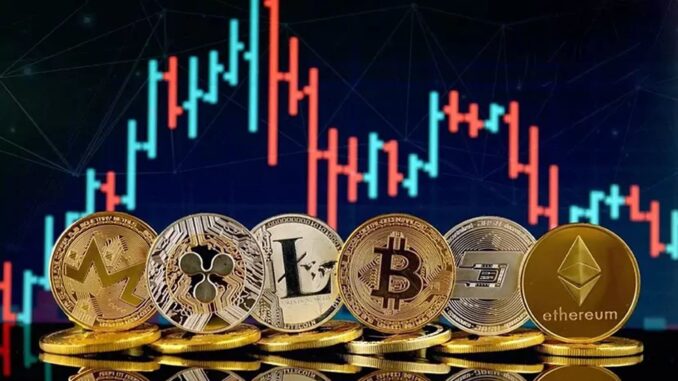
The concept of the metaverse, a collective virtual shared space, is rapidly evolving from science fiction to reality. With the growing popularity of virtual worlds and immersive experiences, cryptocurrencies specifically designed for the metaverse have emerged as a means to facilitate transactions, ownership, and economic activities within virtual environments. In this article, we will explore the emergence of metaverse cryptocurrencies and their potential impact on gaming, virtual real estate, and digital economies.
The Rise of the Metaverse
The metaverse, a concept coined by science fiction author Neal Stephenson in his novel “Snow Crash,” refers to a collective virtual shared space where users can interact with each other and digital objects in real-time. It encompasses virtual worlds, augmented reality (AR), virtual reality (VR), and other immersive environments, blurring the lines between physical and digital realities.
Metaverse Cryptocurrencies: Bridging Virtual and Real Economies
Metaverse cryptocurrencies are digital assets specifically designed for use within virtual worlds and the metaverse. These cryptocurrencies enable users to buy, sell, and trade virtual goods, assets, and services, as well as participate in virtual economies and ecosystems. Metaverse cryptocurrencies leverage blockchain technology to provide secure, transparent, and decentralized transactions within virtual environments.
Potential Impact on Gaming
- In-Game Purchases: Metaverse cryptocurrencies can revolutionize in-game economies by enabling seamless transactions for virtual goods, items, and assets. Players can buy, sell, and trade items with each other using metaverse cryptocurrencies, enhancing the gaming experience and fostering a vibrant virtual economy.
- Ownership of Virtual Assets: Metaverse cryptocurrencies empower players to truly own and control their virtual assets, such as in-game items, characters, and land parcels. Blockchain technology ensures transparent ownership records and prevents duplication or fraud, giving players greater autonomy and value in virtual worlds.
- Monetization for Developers: Game developers can monetize their creations by integrating metaverse cryptocurrencies into their games, enabling new revenue streams such as in-game transactions, digital collectibles, and virtual real estate sales. This incentivizes creativity and innovation in the gaming industry while providing opportunities for developers to generate income.
Impact on Virtual Real Estate
- Tokenization of Virtual Land: Metaverse cryptocurrencies enable the tokenization of virtual real estate, allowing users to buy, sell, and trade digital land parcels within virtual worlds. This creates new opportunities for investment, development, and speculation in virtual real estate markets, mirroring the dynamics of the physical real estate industry.
- Decentralized Virtual Cities: Metaverse cryptocurrencies facilitate the creation of decentralized virtual cities and communities, where users can own, govern, and develop their digital neighborhoods. Virtual cities powered by blockchain technology offer opportunities for social interaction, economic activity, and self-governance within the metaverse.
Impact on Digital Economies
- Borderless Transactions: Metaverse cryptocurrencies enable borderless transactions and economic activities within virtual environments, transcending geographical barriers and currencies. Users can participate in global markets, trade with individuals worldwide, and access a diverse range of goods and services within the metaverse.
- Economic Empowerment: Metaverse cryptocurrencies empower users, particularly creators and entrepreneurs, to monetize their skills, talents, and creations within virtual worlds. Artists, designers, developers, and content creators can earn income by selling digital artwork, virtual goods, and services, contributing to the growth and dynamism of digital economies.
FAQs (Frequently Asked Questions)
Q: What are metaverse cryptocurrencies?
A: Metaverse cryptocurrencies are digital assets specifically designed for use within virtual worlds and the metaverse. These cryptocurrencies enable users to buy, sell, and trade virtual goods, assets, and services within virtual environments.
Q: How do metaverse cryptocurrencies impact gaming?
A: Metaverse cryptocurrencies revolutionize gaming by facilitating in-game transactions, ownership of virtual assets, and monetization opportunities for developers. Players can buy, sell, and trade items with each other, truly owning their virtual assets.
Q: What is the potential impact of metaverse cryptocurrencies on virtual real estate?
A: Metaverse cryptocurrencies enable the tokenization of virtual real estate, allowing users to buy, sell, and trade digital land parcels within virtual worlds. This creates new opportunities for investment, development, and speculation in virtual real estate markets.
Q: How do metaverse cryptocurrencies contribute to digital economies?
A: Metaverse cryptocurrencies facilitate borderless transactions, economic empowerment, and new revenue streams for creators and entrepreneurs within virtual environments. Users can participate in global markets, monetize their skills, and contribute to the growth of digital economies.
Q: Are metaverse cryptocurrencies secure and decentralized?
A: Metaverse cryptocurrencies leverage blockchain technology to provide secure, transparent, and decentralized transactions within virtual environments. Blockchain ensures transparent ownership records, prevents fraud, and empowers users to control their digital assets.
In conclusion, metaverse cryptocurrencies represent a paradigm shift in the virtual economy, enabling seamless transactions, ownership, and economic activities within virtual worlds and the metaverse. By leveraging blockchain technology, these cryptocurrencies empower users, revolutionize gaming, virtual real estate, and digital economies, and pave the way for a decentralized and interconnected virtual future. As the metaverse continues to evolve, metaverse cryptocurrencies will play a pivotal role in shaping the future of virtual economies and digital interactions.

Leave a Reply